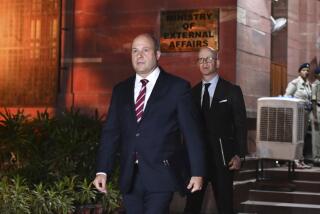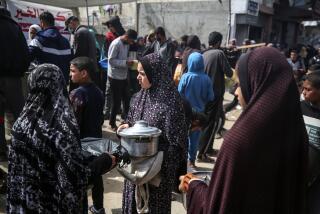Somalia Scandal Shadows Likely U.N. Appointee
- Share via
UNITED NATIONS — The expected appointment this week of a Canadian diplomat to a powerful new job at the United Nations raises new questions about the attempted cover-up of atrocities committed by Canadian troops on U.N. peacekeeping duty in Somalia in 1993.
Canadian sources familiar with the probe say that Louise Frechette, the deputy defense minister who is the anticipated new U.N. deputy secretary-general, was a vigorous critic of the Canadian independent investigation. The probe looked into crimes that included the torture slaying of a Somali teen by members of an elite commando unit.
The sources say they believe that Frechette encouraged the government to shut down the inquiry just as it closed in on allegations that top Canadian officials had sought to prevent news of the scandal from becoming public.
Frechette, 51, who was Canada’s ambassador to the U.N. at the time of the Somalia deployment and has been deputy defense minister since June 1995, has never been directly implicated in the cover-up allegations.
She is believed to be the only candidate in line to become the U.N.’s first deputy secretary-general--a post created last month as a keystone of Secretary-General Kofi Annan’s reform plans.
The holder of the $211,000-a-year post will run the U.N. Secretariat--with its 8,000 employees and $1.3-billion annual budget--during the secretary-general’s frequent trips away from New York.
The new deputy also is expected to take on the job of enforcing reforms of the organization’s often unwieldy bureaucracy.
U.N. officials say Annan’s experience working with Frechette was a major factor in her selection. Other elements in her favor were her popularity with other diplomats and staffers and her reputation as a trouble-shooter.
“Madame Frechette is an extremely capable person,” said former Canadian Defense Minister Doug Young. “And she is very, very cool under fire.”
In addition, she is widely admired in the Canadian civil service, and her supporters say that if she was perceived as a zealous protector of the Defense Ministry by the commission investigating the Somalia allegations, it was because her role was to defend its interests.
Still, the commission was examining not only the most debasing episode in Canadian military history but one directly affecting the U.N.
The troops involved were bringing humanitarian aid to the war-ravaged and famine-ridden East African nation.
In one incident, Canadian soldiers, reportedly annoyed by thefts, were accused of setting out food at their camp as bait and then shooting to death one Somali and wounding another. In the most notorious case, members of a commando unit tortured to death a Somali teenager caught in the camp, pausing in their assault to photograph each other with the victim.
It was last spring that the Canadian government halted the investigation and disbanded the three-member commission it had appointed to conduct the inquiry. As a result, the commission never fully examined allegations that top defense officials destroyed or altered official documents in an unsuccessful cover-up effort.
Some accusations have focused on Robert Fowler, who preceded Frechette as deputy defense minister and replaced her as Canadian U.N. ambassador, a job he still holds.
Published reports on the inquiry indicate that at least 63 documents that were sought by investigators but were never found went through Fowler’s office in 1992 and 1993. Also unresolved because the panel was disbanded were accusations that Fowler and other officials withheld information from the defense minister at the time, Kim Campbell, who later served briefly as prime minister and now is Canadian consul general in Los Angeles.
Fowler declined to be interviewed for this article but previously has denied any wrongdoing. Because the inquiry was aborted, he was never questioned under oath about the cover-up allegations.
Frechette also declined interview requests, saying it would be inappropriate for her to comment on a decision made by her superiors and noting that there had been no announcement on the U.N. position.
Despite debate over how much influence Frechette had on the decision to halt the investigation, however, commission records indicate that she was deeply involved in preparing the Defense Ministry’s response to the investigators’ requests for documents and testimony.
“There’s no doubt in my mind that she was a big mover in getting the early shutdown,” one commission source said, speaking on condition of anonymity.
This official and other commission sources say they believe that the Canadian defense establishment rallied to protect Fowler, preempt any effort to fundamentally reform the command structure and remove the investigation as a political issue in national elections later in 1997.
These sources, including Peter Desbarats, a member of the commission, and Doug Bland, a military analyst who served as a consultant to the panel, fix prime responsibility for ending the inquiry on Prime Minister Jean Chretien and then-Defense Minister Young, not Frechette.
But they noted that, in halting the probe, Young echoed concerns raised by Frechette and the Canadian military’s top brass that the inquiry had become a runaway probe. Young said the investigation had dragged on for too long, nearly one year; had cost too much money, $17.5 million; had exceeded its jurisdiction; and was holding up, rather than enhancing, defense reform.
In a telephone interview from Ottawa, Young flatly denied that Frechette had influenced his decision to end what he called the “charade” of the inquiry.
“It was my idea. I suggested it to the Cabinet, and we went ahead,” Young said. “Very candidly, nothing that was said, done, suggested, nudged or whatever [by Frechette] had any effect on the decision.”
Bland said he is sure that Frechette was among those supporting an early end to the inquiry, but that Young probably would have killed the commission regardless of what his deputy recommended.
According to commission members and other sources close to the inquiry, Frechette was fiercely protective of the Defense Ministry in negotiations with the investigators. She also complained in letters to the minister that the probe was straying beyond its mandate.
The panel, appointed in early 1995, was made up of two judges, Gilles Letourneau and Robert Rutherford, and Desbarats, a former journalism school dean and reporter.
In November, Desbarats published a book on his experience called “Somalia Cover-Up.”
Under Canada’s parliamentary system, the deputy defense minister, the highest-ranking civil servant in the department, has most of the responsibility for day-to-day administration and many of the powers reserved for the defense secretary in the U.S. Deputy ministers are so powerful that they are referred to collectively in Ottawa as “mandarins,” after the elite officials of the Chinese emperors.
Perhaps no one personifies the mandarin better than Fowler, often referred to as the best-connected bureaucrat in Canada.
He has had a long working relationship with Chretien and Chretien’s mentor, former Prime Minister Pierre Elliott Trudeau. Fowler’s sister is married to Romeo LeBlanc, who, thanks to a Chretien appointment, is Canada’s official representative in Ottawa of Britain’s Queen Elizabeth II and acting head of state.
But Frechette also has an impressive network of associates. Her tenure as Canadian ambassador to the U.N. coincided with Annan’s term as U.N. undersecretary-general for peacekeeping. Annan’s chief military advisor at the time was Gen. Maurice Baril, who was on loan to the U.N. from the Canadian army. Baril now is Canada’s chief of defense staff, the country’s top-ranking military officer.
Frechette has also served as Canada’s ambassador to Argentina, as assistant deputy minister for Latin American affairs in the Foreign Ministry and as a principal planner of the Group of 7 economic conference in Halifax, Canada, in 1995.
Annan has refused to discuss publicly whom he had under consideration as deputy secretary-general except to say he would prefer a woman. Other U.N. officials, however, have said Frechette was the only candidate after others withdrew from consideration.
Reports of the Somalia atrocities initially triggered outrage in Canada and contributed to a decision to disband the unit involved. But public interest faded as the commission’s nationally televised public hearings dragged on month after month, featuring labyrinthine and often contradictory testimony.
One top general, Jean Boyle, resigned after giving evasive testimony, but other high-level officials survived or avoided appearing. Meanwhile, morale in the armed forces suffered, and the military’s public image was badly eroded.
When Young unexpectedly cut the probe short, the commissioners were prevented, they said in a final report, from exploring “the relative indifference displayed by senior officials to . . . a brutal and senseless torture . . . that contrasted sharply with their concern about publicity the incident might receive, the management of information about the incident and the potential effect publicity might have on the image of the Canadian [armed] forces.”
The political furor prompted by Young’s announcement ending the probe lasted only a few weeks.
Desbarats said that response “throws an interesting spotlight on an aspect of the Canadian character that is so trusting of government and willing to go to almost any lengths to keep things quiet.”
More to Read
Sign up for Essential California
The most important California stories and recommendations in your inbox every morning.
You may occasionally receive promotional content from the Los Angeles Times.










